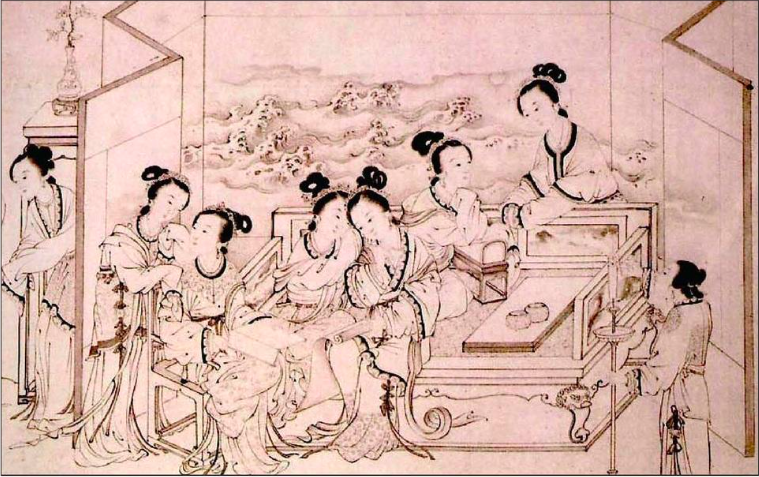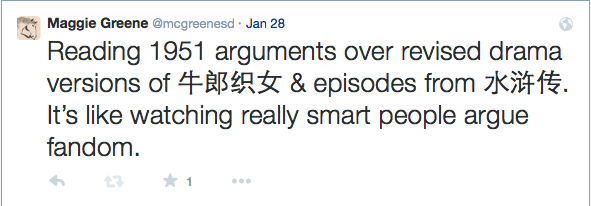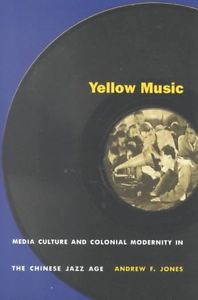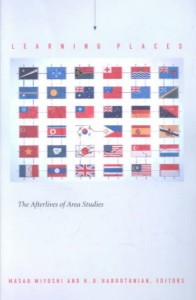Well, the semester is well & truly underway here. I’ve been having (anxiety-ridden) fun with my seminar – a topic I’ll come back to in a few weeks – and (completely anxiety ridden) not-so-fun with my manuscript, although I have been making forward progress. On the one hand, I’ve enjoyed getting back into my sources, trawling various databases, and the like; on the other, I keep bumping into walls that remind me I’m Not Very Good at some of this stuff. By which I mean: I have a lot of talents as a scholar (I think), but I also work on a kind of weird topic that’s at the intersection of several different disciplines and sub-disciplines, which often is going to make one feel like an idiot (“Why don’t I know everything about, well, everything“). There have been tears and angry tirades – and the grownup equivalent of temper tantrums directed at one’s self, which in my case usually means stalking off to soak in the bath for a good long while & having some comforting, juvenile dinner, like beer and croutons. But it hasn’t been unproductive, and once I yank myself out of a funk, I usually realize I am making progress!
The past few weeks, I’ve been revisiting/rewriting & doing some fresh work on one of my favorite little interludes from my research – a 1951 debate on drama adaptations of the famous Chinese story, “The Cowherd and the Weaving Maid” [niulang zhinü 牛郎织女]. The story is one of two celestial lovers, who wind up so engrossed in each other & having passionate, celestial sex that they (a) stop herding the celestial cows and (b) stop weaving celestial cloth. This makes other denizens of the celestial realm pretty angry, both because the cows are wandering everywhere and they have no new fabric for clothing. So – in the interests of the greater celestial good – the lovers are forcibly separated, only allowed to meet once a year. This is the basis for the Double Seven Festival – Qixi 七夕, or Tanabata in Japan: the stars Vega and Altair “meet” on the seventh day of the seventh lunar month (this does  actually happen – another star serves as the “bridge”). This has, as far as I know, turned into some bizarre Valentine’s Day spin-off (at least partially), but originally, it was a celebration of women’s work (one of its alternate names is the Qiqiaojie 乞巧节, the ‘Begging for Skills Festival,’ referencing domestic skills & the practice of qiqiao 乞巧, making offerings to the Weaving Girl and holding competitions related to domestic tasks, like threading needles only by the light of the moon) & also one hoping for love or celebrating bonds. Or for missing lovers who were absent – not uncommon, at least among the poetry-writing literati, when husbands were not infrequently off on far-flung bureaucratic assignments and the like. In any case, it’s always struck me as a good deal mopier than Valentine’s Day, for the coupled and singled alike.
actually happen – another star serves as the “bridge”). This has, as far as I know, turned into some bizarre Valentine’s Day spin-off (at least partially), but originally, it was a celebration of women’s work (one of its alternate names is the Qiqiaojie 乞巧节, the ‘Begging for Skills Festival,’ referencing domestic skills & the practice of qiqiao 乞巧, making offerings to the Weaving Girl and holding competitions related to domestic tasks, like threading needles only by the light of the moon) & also one hoping for love or celebrating bonds. Or for missing lovers who were absent – not uncommon, at least among the poetry-writing literati, when husbands were not infrequently off on far-flung bureaucratic assignments and the like. In any case, it’s always struck me as a good deal mopier than Valentine’s Day, for the coupled and singled alike.
Regardless of its mopey (or not) character, it’s an important story & one that has been rather beloved on Chinese stages. Thus, the 1951 debate: to the consternation of many people, some particularly enthusiastic playwrights had been remaking the story to better speak to contemporary events. After all, art was supposed to be drawn from and speak to the people, and that included contemporary concerns, not abstract star lovers. In 1951, this largely meant the Korean War, so there were versions where Harry S. Truman (yes, Truman) was represented in the guise of the King of Demons, supporting characters become helpmates of feudal morality & the patriarchy, the Cowherd & the Weaving Maid actually didn’t mind being separated because it left more time for work (my title for this chapter is actually “The Weaving Maid as Labor Hero”), and the like. Some intellectuals liked this: it was taking art and really making it serve the present! But many intellectuals (the winning side of this debate, actually – both in the short term, and on the whole, at least until 1963/1965) emphatically did not like the idea of Harry Truman (or much of anything else) intruding on a classic, beloved Chinese story, and objected. Loudly. Very loudly. On the pages of People’s Daily, the CCP’s print mouthpiece.
It’s a very interesting debate, and pretty fun (I take particular glee in quoting some of the more snippy parts of it) – I discovered it more or less by happenstance, but it has a lot of things to say about drama reform in this early period, as well as theoretical issues. It’s largely been read solely as a theoretical debate (one on “formulism,” “subjectivism,” and “historical materialism” – the primary concerns here being approaches to historical material). I’m more interested in the actual subject matter of a few key essays, which are fundamentally, I think, addressing questions about how best to handle China’s “traditional” culture and explicating the relationship between art and socialism. There’s theory, to be sure, but we’ve generally looked past all the rest. It’s also simply pretty fun: a spicy, snarky argument between brilliant people – and there’s a certain casualness I don’t usually associate with my sources. It really does remind me of fans debating the particulars of a plot point – just really, really smart fans, deconstructing their perceived enemies in really smart ways. I described it recently on Twitter like this:




I had a realization at some point while writing my dissertation, while tracing these kinds of debates between 1949 and 1963. For the most part – with very few exceptions – even these pretty violent debates (the subject of the Weaving Girl debate received a serious dressing down on the pages of People’s Daily – it can seem laughable in retrospect, especially some of the words hurled from this side to that, but there was someone who had to read this stuff written about them and their work in the CCP mouthpiece) look less like hardened ideological adversaries than people who are more or less on the same side, just have some quibbles with execution, interpretation, etc. (Kirk Denton points this out regarding Hu Feng & Mao, at least on some subjects, and certainly it’s been noted in a lot of more recent scholarship). From the distance of 70 years, minor stuff: and after all, most of them – with very few exceptions – wound up on the wrong side of the Party during the Cultural Revolution. In the end, time – and Mao – were the great equalizers.
 When I started looking more seriously at older parts of the historiography, I realized the field had spent some time sorting many of these people into various categories. “Establishment” intellectuals, for instance, or “revolutionary” intellectuals. These divisions can be useful, to a point; but they can also obscure a larger point, which is there was frequently a lot more similarities between these people than sorting them into different “camps” would lead you to believe. I don’t mean to imply I think there weren’t differences, or that seemingly minor differences don’t have an impact. As the political trials and travails of the 1950s and early 1960s – never mind the Cultural Revolution – indicate, there were camps, and your opinion on certain matters could have deadly consequences. But at the same time, from a distance of 70 years, there are a lot more similarities than differences. All of the people in my 1951 debate, for instance, agreed that China’s traditional culture was important and should be preserved. They disagreed on what that preservation should look like (among other things). But they agreed on one of the most important things of all: that this was worth arguing about, fighting over.
When I started looking more seriously at older parts of the historiography, I realized the field had spent some time sorting many of these people into various categories. “Establishment” intellectuals, for instance, or “revolutionary” intellectuals. These divisions can be useful, to a point; but they can also obscure a larger point, which is there was frequently a lot more similarities between these people than sorting them into different “camps” would lead you to believe. I don’t mean to imply I think there weren’t differences, or that seemingly minor differences don’t have an impact. As the political trials and travails of the 1950s and early 1960s – never mind the Cultural Revolution – indicate, there were camps, and your opinion on certain matters could have deadly consequences. But at the same time, from a distance of 70 years, there are a lot more similarities than differences. All of the people in my 1951 debate, for instance, agreed that China’s traditional culture was important and should be preserved. They disagreed on what that preservation should look like (among other things). But they agreed on one of the most important things of all: that this was worth arguing about, fighting over.
Largely because I was bound up in trying to understand some of the more theoretical terms of this debate, I missed much of a more recent debate, on the subject of formalism and games. The fact that I was trying to figure out WTF subjectivism-formUlism (subjective-formulism? subjectivism & formulism?) encompassed – and fighting with autocorrect, which kept inserting “formalism” for “formulism” – while people on Twitter & in the blogosphere were viciously arguing about formAlism & games was a weird coincidence. Perhaps it was the spelling similarity in these -isms that made me ponder the similarity between the nature and shape of these debates.
I’m won’t rehash everything here – partially because I haven’t read everything (though I’ve looked at a lot), but partially because I’m less interested in the particulars than the shape of the debate – but I couldn’t help but read through everything and think that some historian, 70 years hence, would be sitting and reading the posts and laughing her head off, in much the same way that I laugh and laugh and laugh when reading my Weaving Girl debates. Not because the stakes were laughable, or the subject, or the writing, or anything else: but because that historian 70 years hence is going to know how things play out, and it’s entirely possible (likely, even) that the denouement will make what came before seem minor in comparison. But also that you’re witnessing – by virtue of being removed from it – people who more or less fall on the same side of an issue argue in a manner not entirely befitting their lack of an ideological gap. I don’t mean everyone falls on the same side of the “formalism” debate. What I mean is that everyone agrees games are important and worth talking about and studying.
The most striking thing I read, while trying to catch up on some of this, was actually Ian’s comments on game studies as a discipline – found at the bottom of this post. Largely because it struck me as a pretty self-reflexive comment on a field that he has obviously had a large part in, and also has a lot of investment in. And it summed up why I found this all so achingly reminiscent of those “ancient” Weaving Girl debates: ultimately, if game studies is the academic joke Ian sketches it as, the people on both sides of this debate have a lot more in common with each other – at least where games are involved – than they do with the rest of the academy. This isn’t a “can’t we all get along” plea – Ian’s right, I think, in that debate is good in the long run (history hasn’t died as a discipline because we fight like cats and dogs over approach and theory, for instance. Plenty of people have serious disdain for the kind of history I do, and I have my own preferences when it comes to how to do history. That hasn’t stopped each of us from doing our thing – sometimes vicious repartee in major journals, monographs & edited volumes notwithstanding – and I daresay that kind of discussion and debate means the field’s a lot healthier than it would be if we all had the same approach to everything).
And, perhaps (well, almost certainly) ill advisedly, I’ll comment on what’s perplexed me most: the characterization of the “old guard” that says they’re involved in a “power grab” and/or some evil hegemonic power. Game studies has been, in my experience, the most open academic group I’ve been a part of. The idea that there’s essentially an evil cabal denigrating and trying to shut down points of view or research that don’t match their own really, really does not square with my own experience. Yes, I speak from a position of Privilege on multiple levels & that of course colors my perceptions. I “got into” game studies as a grad student because I wrote for Kotaku; I am now a tenure-track professor (of history). But I’m a serious outsider on a disciplinary level: my primary work is on the high socialist period of the PRC, for crying out loud. Even if I wanted to, I’m not equipped to do research on games in the way that much of the “old guard” is. And I don’t want to. And that’s been A-OK – I’ve never been cold shouldered, ignored, told to “kiss the ring” of important scholars, or belittled for being a cultural historian who doesn’t even do games as a primary subject of research. On the contrary, I’ve rubbed shoulders with a lot more luminaries – the “old guard,” I guess – at game studies conferences than I ever have in my home discipline. Doesn’t mean I always agree with them, or them with me, but it’s been a field made up of people (including the powerful and privileged) who have been really welcoming – I dare say encouraging – of different approaches. To be blunt, I’m a lot less freaked out about being a cultural historian when I go to a game studies conference than I am when interfacing with some members of my own field.
At FDG 2014, I was asked for the first time ever “What are you doing here?” (valid question, as it’s a conference where a Chinese historian is going to stick out more than at, say, DiGRA – which was the person’s point). But from that question, which I guess I could’ve taken as sign of latent hostility, flowed a really interesting, productive discussion, one that actually gave me an epiphany about my manuscript. Being in a relatively alien environment, with neither area studies nor history (nor games, for that matter) to fall back on as some kind of disciplinary common ground, I had to articulate my work in a way that made sense for someone whose academic context looks very, very different than mine. Experiences like that one are a reason I still make an effort, however small, to keep in the game studies milieu.


 Games are interesting to plonk down in this context, because we treat them very differently than, say, Chinese opera: they’re global in a way a lot of other cultural products aren’t, almost from their inception. In Yellow Music, Andrew Jones discusses the circulation of jazz (and technology) in a way that’s resonated strongly with me over the years (in a monograph that has the hands-down best conceptual use of “colonial modernity” I’ve ever come across). He notes that one African- American’s account of the Chinese jazz age of 1930’s Shanghai “alerts us to the folly of trying to understand Chinese jazz as an example of Western influence on Chinese musical forms. Nor can the ‘Chinese’ in ‘Chinese jazz’ be relegated to the realm of the merely adjectival ….” He further notes that we must “look at the ways in which both (and indeed all) parties have been and continue to be inextricably bound up in a larger and infinitely more complex process.” While we sometimes append some sort of national marker to games (the ‘Japanese’ in JRPGs springs to mind here), we frequently don’t – often because national origins are obscured through translation and localization, and a rather interesting process of naturalization.
Games are interesting to plonk down in this context, because we treat them very differently than, say, Chinese opera: they’re global in a way a lot of other cultural products aren’t, almost from their inception. In Yellow Music, Andrew Jones discusses the circulation of jazz (and technology) in a way that’s resonated strongly with me over the years (in a monograph that has the hands-down best conceptual use of “colonial modernity” I’ve ever come across). He notes that one African- American’s account of the Chinese jazz age of 1930’s Shanghai “alerts us to the folly of trying to understand Chinese jazz as an example of Western influence on Chinese musical forms. Nor can the ‘Chinese’ in ‘Chinese jazz’ be relegated to the realm of the merely adjectival ….” He further notes that we must “look at the ways in which both (and indeed all) parties have been and continue to be inextricably bound up in a larger and infinitely more complex process.” While we sometimes append some sort of national marker to games (the ‘Japanese’ in JRPGs springs to mind here), we frequently don’t – often because national origins are obscured through translation and localization, and a rather interesting process of naturalization.
